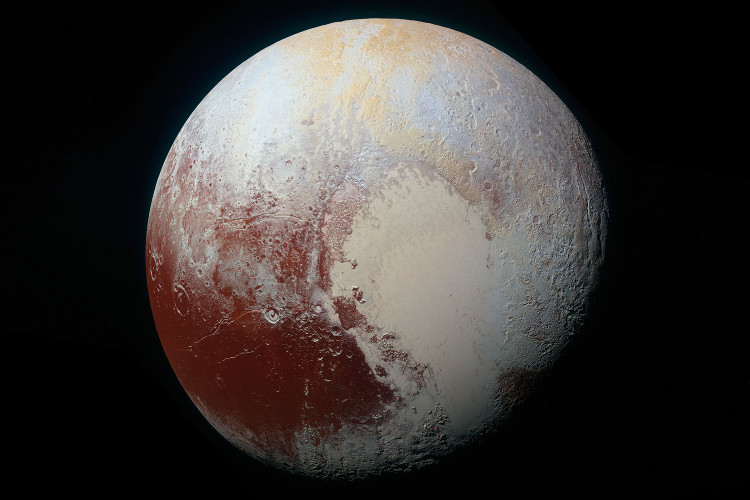What is the final border in science?
Alan Stern's position will give us a view of a NASA scientist at the final frontier in science.
Each species has a special trait, an evolutionary advantage that allows them to survive and grow . The special trait we really need is of course the human brain. More specifically, it is our ability to learn and explore, find new information and then communicate what we learn so that other people of the same species can build upon (and improve) it.
However, very few people really understand the importance of this knowledge and the discovery like Alan Stern . Alan Stern is the principal investigator and leads the mission of New Horizons, bringing the probe to Pluto of NASA center. He is (literally) contributing to bringing people to the new world.
Pluto: the journey to the unknown realm
Over the past 70 years, Pluto is the 9th planet in our solar system. In 2003, the International Astronomical Union (IAU) decided to reorganize this planet as a dwarf planet . It is 58 billion kilometers from the Sun while the Earth is only 150 million kilometers farther away from the Sun. Pluto is a sphere full of rocky mountains.

Pluto - (Photo: NASA).
Alan Stern is the head of New Horizons mission of the US Aerospace Agency (NASA) towards Pluto. Having spent nine years, surpassing 4.8 billion kilometers in 2015, New Horizons has flown across and provided many images, changing the way it views the planet.
At Edison Awards 2016, Alan Stern once emphasized the value of knowledge and discovery of the unknown . He also talked about the great victories we can make as a society and as a world, when we really invest in these things.
Why leave Earth?
This scientist thinks there are many reasons but for him, the following two reasons are the main reasons."Beyond that we are re-creating knowledge is that we create a larger society. We conduct large, historical exploration. That's what people read not 1 week, 1 month. later, but decades later and centuries later, it marks the desire for our time - a bigger society. "
In short, what we invest in (whether it's sports, war or science) is a direct reflection of both the values we hold and the society we under construction.
Stern added that while global expansion businesses clearly have a social impact on all and a great influence on individuals. He affirmed: "It inspires. In particular, it makes young people come back to science, technology, machines and mathematics. It inspires them to become part of knowledge and economies. high technology ".

Alan Stern - (Photo: NASA).
Stern continued by highlighting the importance of such encouragement: " There is nothing in what we do with technology, management, innovation, nothing in science that we can achieve. It's as important as how we touch other people with this inspirational project. "
He concludes by noting that in these respects, through exploration and discovery " we do something a bit bigger than life is that we create the future."
Where do we go?
We went to Pluto and we are on our way to the Kuiper belt . We even traveled into interstellar space, where do we go now?
Of course there is still plenty of space to explore, but when it comes to the new plan, Stern does not mention exploring aliens or the project of conquering a distant planet, Alan Stern, referring to humanity .
"What I am most interested in, the most interesting is how to increase the human life cycle, because when people live 2 or 3 times the current life expectancy, they will change society in a fundamental way."
He said that increasing the lifespan will change the way we think and live : "The way we care about the environment is because we stick with it for a long time. The way we care about parity and how they are I live together . I think all these things will be completely transformed when the life cycle expands. I think that is the most interesting border in science. "
And finally, what every science and discovery does is to make our species better.
- Video: Elephants naturally cross the border before the inability of the Chinese border
- The final product will be contracted to the scientist
- Discover the 5 most dangerous borders on the planet
- Create a border (border) around the text.
- Create a border (border) for the entire text file
- Strange stories at the border of countries
- Earthquake on Iran-Iraq border: There are nearly 7,000 people dead
- November 18: Begin the end of the 2006 Vietnam Talent Contest
- The final picture of Opportunity robot was captured and it hurt the online community
- Video: Mysterious UFO teammate in the sky of US-Mexico border
- Robocon 2008: 32 final teams in HCMC
- Latest version of Final Fantasy released
 'Fine laughs' - Scary and painful torture in ancient times
'Fine laughs' - Scary and painful torture in ancient times The sequence of numbers 142857 of the Egyptian pyramids is known as the strangest number in the world - Why?
The sequence of numbers 142857 of the Egyptian pyramids is known as the strangest number in the world - Why? History of the iron
History of the iron What is alum?
What is alum?